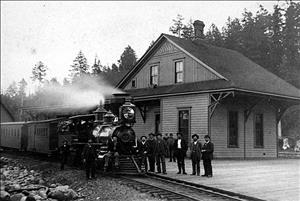On July 24, 1906, Tenino, located in Thurston County, officially incorporates as a city after residents -- apparently eager to generate resources for police and fire protection -- vote 76-36 in favor of doing so. Nevertheless, two months later the primary retail block of the town will be destroyed in a fire that officials will suspect is arson.
Becoming a City
On June 21, 1906, Thurston County commissioners voted to permit Tenino residents to vote on whether or not to incorporate. According to The Seattle Daily Times, "There were large opposing delegations before the board yesterday and the arguments were heated. The sentiment of the town, however, appears to be strongly in favor of incorporation" ("Tenino May Incorporate ...").
The reporter made no mention of the reasons given by those opposed to incorporation. As is the case with many small towns considering incorporation, it appears that, for those in favor, fire and police protection were major considerations. "Two fires recently, believed of incendiary [arson] origin, hastened the movement to secure police protection," wrote the Seattle reporter ("Tenino May Incorporate ...").
Sometime between June 21 and July 24 residents voted 76 to 36 in favor of incorporation. Henry Keithahn (1869-1947), owner of a local creamery, was elected as the city's first mayor.
A Fire Chief and a Fire
One of Keithahn's first acts after incorporation officially took place on July 24 was to appoint Leslie J. Johnson as fire chief. The fire department itself was not organized until 1909.
Only two months later a fire -- also a suspected arson -- broke out in the grocery store of council member George Sumption. The fire started at this store at the corner of Sussex Avenue and Olympia Street and burned down the entire block, with the exception of a saloon on the opposite corner. A reporter wrote, "It was only by the great efforts of the fire fighters, aided by a lack of wind, that the town was saved from entire destruction" ("Fire Lays Waste Business Part of Tenino").
One silver lining was that the destroyed wooden buildings were soon replaced with stone buildings using sandstone from local Tenino quarries.
A New City's Politics
Initially, politics in the new city were not very democratic. Scott McArthur, whose father and grandfather were active in Tenino politics, later wrote that, "Dad said that William McArthur and some of the acknowledged leaders of the town would get together before each election to decide who ought to run for the town council" (McArthur, 121).
Rather than voting by secret ballot, votes were conducted by voice at meetings.

